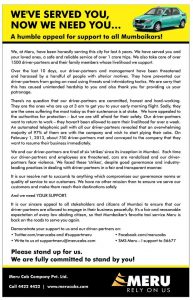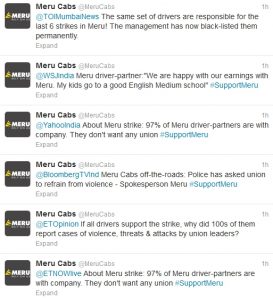As a frequent air traveler in my previous job, I have used the services of Meru almost every other week. It used to be Meru, as first choice, and if it fails, for some reason, Easycabs as option 2.
The reasons for failing and individual circumstances are highly specific and having been annoyed with one such instance, I even blogged about it.
But, there’s no questioning the value I get out of organized, clean and reliable (largely) cab services like Meru or Easycabs.
In my mind, I don’t differentiate much between Meru and Easycabs and would gladly use them alternatively. Since both use Renault (now Mahindra) Logan (now Verito), there is even less differentiation between the two, at least in my head.
Given that context, I was amazed to see Meru take to social media (and expensive print advertising) their latest issue with an union that is threatening to disrupt their services.
The overall communication seems to be designed to tug at your heartstrings – I have got an email with this heartfelt letter. I see it being promoted on their Facebook page and Twitter handle. There is also an (over)enthusiastic intern at the Twitter handle who seems hell bent on tagging every single media outlet what Meru’s stand is, in this whole issue.
They have even listed a phone number where they ask people to send ‘Meru – I support’, besides an email ID, ‘supportmeru@merucabs.com’.
All this is quite interesting. But I do wonder what is the earthly point of this support-gathering business, particularly with end customers.
Consider the earlier point of mine – I do not differentiate between multiple cab services. It is a commodity for me, unless, of course, one of them offers a stand-out experience at similar prices and consistently.
For example, I haven’t had the opportunity to use Olacabs, but quite like the approach of the mobile map based taxi hailing part. That’s a stand-out feature I may pay a premium for and may use consistently, if I had that consistent a need. My needs are rare and limited these days – early morning or late night airport or railway station trips. From the perspective of someone who depends on such services a lot more often, I’d assume the mileage would vary. But again, even they may not (I’m assuming) stay loyal to one service and pick the one that did not ditch the last time they tried it. And change if it did. And keep shifting as appropriate.
It is, in essence, what works, at that time, day, hour. If it doesn’t, you move on to another that does. And I have heard enough people complain about unreliable service from every cab service in India.
From this lack-of-loyalty perspective, I find it odd that Meru feels confident enough to seek end-user support. This is all anecdotal – and Meru may have better numbers to back this campaign – but, it seems a bit forced that they are seeking support so openly and emotionally, as if this will change their fortunes in India.
That brings me to the more important point – what is the point of all this support?
Let us assume 100,000 people show their solidarity via email, text message, Twitter and Facebook, to Meru. What happens then?
Is this call for support aimed at…
(a) …assuaging potential passengers and requesting them to not stop using Meru’s services anticipating violence/problems?
That’s a valid concern to address, but the tone of the message doesn’t seem to address this specific concern of customers.
The structure of the appeal (humble appeal, to be specific) is:
– Our history in Mumbai
– Some people are messing with us, we are sorry for that
– <emotional sitar> Our driver-partners work very, very hard
– Some people continue to mess with us
– We won’t be bothered with that mess
– Support us
My assumption is that, if the specific mandate is to address potential passengers’ worry about safety of hiring a Meru cab, I’d perhaps harp seriously on what Meru has done to give them the assurance that his/her journey would be disruption-free.
Have they sought police protection? Would police protection work at all, for so many cabs, on multiple parts of a city? Have they got more cabs on the road and in their fleet to ensure that they make up for the striking driver-non-partners’ absence?
The crux is… why should a potential customer trust Meru with his/her travel plan? I’m not sure that comes across in the emotional appeal.
(b) …seeking public support for resumption and continued functioning of Meru the brand?
Let us park the other issue of lack of brand loyalty for a minute and assume that there indeed is brand loyalty to Meru. What next?
Would these loyal customers start using Meru despite being aware that there are some ‘union problems’? If they still use it and get into one such ‘problem’ in the middle of the travel, would they stand up to the Meru driver-partner and talk on his and Meru’s behalf? I’d love to see them doing that, but let’s be practical here. This is a country that does not bother to stop and help two stark naked, injured youngsters on the road who were incidentally thrown off from a bus.
My gut feeling (I may be completely wrong here and should think more positively – I agree) is that most passengers, when faced with such a situation, would like to rush to the boot, pick their belongings and run as fast as they could… to avoid personal injury, a trip to the hospital and/or a night at the police station.
I won’t blame them – the ‘system’ (sorry Mr.Bhandarkar) is like that.
(c) …winning over some/more protesting driver-partners by showcasing the sheer love that has poured from potential and existing customers?
‘Look here, angry driver-partners! See these 100,000 emails? That is the love people have towards the brand you are fighting against. Now, get back to work’?
Despite that frivolous tone, I see some point in this act. But again, I’m not fully confident that mere show of strength would help convince them to get back to work.
The issue seems to be much deeper than something that can be sorted with print advertisements and social media support calls. This piece from FirstPost explains it well.
When I first noticed the call for support all over the place, I was left wondering why Meru is involving potential and existing customers in the mix, for what seems predominantly like an issue with the basic business model of what Meru is offering its driver partners. And the Shiv Sena-led, union-led politics involved.
I’m not sure what this ‘support’ can do to Meru, particularly when it trickles in the form of emails, text messages, Facebook likes + comments and tweet responses. When the world is wondering about the pointlessness of online activism, it is interesting to see Meru take it seriously for their survival.
All this sounds so somber and serious, so let me leave you with this – a comment from Meru’s Facebook page.




